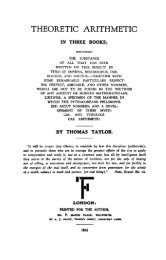Plutarch - Discourse to an Unlearned Prince.pdf - Platonic Philosophy
Plutarch - Discourse to an Unlearned Prince.pdf - Platonic Philosophy
Plutarch - Discourse to an Unlearned Prince.pdf - Platonic Philosophy
You also want an ePaper? Increase the reach of your titles
YUMPU automatically turns print PDFs into web optimized ePapers that Google loves.
ill; for the former is the cause of the other; <strong>an</strong>d this is a noble <strong>an</strong>d generous sort of fear, well becoming a<br />
prince, <strong>to</strong> be solici<strong>to</strong>us lest <strong>an</strong>y harm should befall his subjects unawares:<br />
As faithful dogs, surprised with sudden fear,<br />
When once they see the savage beasts appear,<br />
Not of themselves, but of their flocks take care.<br />
Epaminondas, when on a certain festival day the Theb<strong>an</strong>s gave themselves up wholly <strong>to</strong> drinking <strong>an</strong>d<br />
carousing, went about alone <strong>an</strong>d viewed the arsenal <strong>an</strong>d the walls of the city, saying, that he was sober<br />
<strong>an</strong>d vigil<strong>an</strong>t that others might have liberty <strong>to</strong> be drunk <strong>an</strong>d <strong>to</strong> sleep. And Ca<strong>to</strong> at Utica, when he had<br />
called <strong>to</strong>gether by proclamation all his soldiers that had escaped the slaughter <strong>to</strong> the seaside, caused them<br />
<strong>to</strong> embark in ships; <strong>an</strong>d having prayed for their prosperous voyage, returned home <strong>an</strong>d killed himself,<br />
leaving <strong>an</strong> example <strong>to</strong> princes, whom they ought <strong>to</strong> fear <strong>an</strong>d what they ought <strong>to</strong> contemn. On the other<br />
h<strong>an</strong>d, Clearchus, king of Pontus, creeping in<strong>to</strong> a chest, slept therein like a snake. And Aris<strong>to</strong>demus lay<br />
with his concubine in a bed placed in <strong>an</strong> upper room over a trap-door, her mother removing the ladder<br />
as soon as they were got up, <strong>an</strong>d bringing it again in the morning. How then, think you, did he fear <strong>to</strong> be<br />
seen in the theatre, in the judgment-hall, in the court, or at a feast, who had turned his bed-chamber in<strong>to</strong><br />
a prison? For indeed good princes are possessed with fear for their subjects, but tyr<strong>an</strong>ts with fear of them;<br />
insomuch that their timorousness increaseth with their power, since the more people they have under<br />
their dominion, so much the more objects they see of dread <strong>an</strong>d terror.<br />
5. Neither is it probable or convenient (as some philosophers affirm) that God should be mingled<br />
<strong>to</strong>gether with matter that is al<strong>to</strong>gether passive, <strong>an</strong>d with things obnoxious <strong>to</strong> innumerable necessities,<br />
ch<strong>an</strong>ces, <strong>an</strong>d mutations; but <strong>to</strong> us he seems <strong>to</strong> be placed somewhere above with the eternal nature that<br />
always operates after the same m<strong>an</strong>ner; <strong>an</strong>d proceeding (as Pla<strong>to</strong> saith) on sacred foundations, according<br />
<strong>to</strong> nature, he brings his works <strong>to</strong> perfection. And as he hath placed the sun in the firmament, as a clear<br />
image of his most sacred <strong>an</strong>d glorious essence, in which, as in a mirror, he exhibits himself <strong>to</strong> the<br />
contemplation of, wise men; so in like m<strong>an</strong>ner, the splendor of justice that appears in some cities is a<br />
kind of representation of the divine wisdom, which happy <strong>an</strong>d prudent persons describe by the help of<br />
philosophy, conforming themselves <strong>to</strong> those things which are of a most sublime <strong>an</strong>d excellent nature. It<br />
is certain that this disposition of mind c<strong>an</strong>not be attained but by the doctrine of philosophy; otherwise<br />
we shall lie under the same circumst<strong>an</strong>ces as Alex<strong>an</strong>der, who seeing Diogenes at Corinth, <strong>an</strong>d being<br />
as<strong>to</strong>nished at his ingenuity <strong>an</strong>d majestic gravity, let fall this expression: If I were not Alex<strong>an</strong>der, I would<br />
choose <strong>to</strong> be Diogenes. For being almost oppressed with the weight of his own gr<strong>an</strong>deur <strong>an</strong>d power,<br />
which are the impediments of virtue <strong>an</strong>d ease, he seemed <strong>to</strong> envy the happiness of a threadbare cloak <strong>an</strong>d<br />
pouch, with which the Cynic rendered himself as invincible as he could be with all his armor, horses, <strong>an</strong>d<br />
pikes. However, he had <strong>an</strong> opportunity <strong>to</strong> philosophize <strong>an</strong>d <strong>to</strong> become Diogenes in his mind, though he<br />
remained Alex<strong>an</strong>der in his outward state <strong>an</strong>d condition, <strong>an</strong>d he might more easily be Diogenes, because<br />
he was Alex<strong>an</strong>der; forasmuch as <strong>to</strong> keep the vessel of his prosperous fortune steady, which was <strong>to</strong>ssed<br />
with the winds <strong>an</strong>d waves, he s<strong>to</strong>od in need of a good qu<strong>an</strong>tity of ballast <strong>an</strong>d of a skilful pilot.<br />
6. Amongst the me<strong>an</strong> <strong>an</strong>d inferior sort of people, folly mingled with weakness is destitute of <strong>an</strong> ability<br />
<strong>to</strong> do mischief; <strong>an</strong>d the mind is vexed <strong>an</strong>d distracted by it, as a distempered brain is with troublesome<br />
dreams, insomuch that it hath not strength enough <strong>to</strong> execute what it desires. But power joined with a<br />
corrupt <strong>an</strong>d depraved inclination adds the fuel of madness <strong>to</strong> the fire of the passions. So true is that<br />
saying of Dionysius, who declared, that he then chiefly enjoyed his authority, when he speedily<br />
performed what he designed. But herein lies the greatest d<strong>an</strong>ger, lest he that is able <strong>to</strong> do all things that<br />
he desires should desire those things that he ought not:<br />
The word’s no sooner said, but th’ act is done.

















